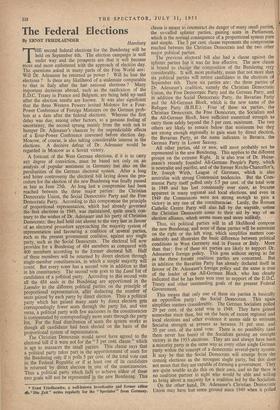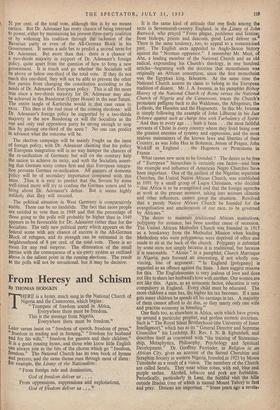The Federal EleCtions
By ERNST FMEDLAENDER Hamburg
* Ernst Friedlaender, a well-known broadcaster and former editor
4116 "Die Zeit" writes regularly for the " Spectator " from Germany. THE second federal elections for the Bundestag will be held on September 6th. The election campaign is well under way and the prospects are that it will become more and more embittered with the approach of election day. The questions asked in many parts of the Free World are: Will Dr. Adenauer be returned to power ? Will he lose the elections ? Is there any likelihood of a stalemate comparable to that in Italy after the last national elections ? Many important decisions abroad, such as the ratification of the E.D.C. Treaty in France and Belgium, are being held up until after the election results are known. It was also significant that the three Western Powers invited Molotov for a Four- Power Conference of Foreign Ministers on the German prob- lem at a date after the federal elections. Whereas the first delay was due, among other factors, to a genuine feeling of uncertainty, the second sprang mainly from the wish not to hamper Dr. Adenauer's chances by the unpredictable effects of a Eour-Power Conference convened before election day. Moscow, of course, is also taking considerable interest in the elections. A decisive defeat of Dr. Adenauer would be regarded in Moscow as a Soviet victory.
A forecast of the West German elections, if it is to carry any degree of conviction, must be based not only on an analysis of popular sentiment in Germany but also on the peculiarities of the German electoral system. After a long and bitter controversy the electoral bill laying down the pro- cedure for the election of the new Bundestag was finally passed as late as June 25th. At long last a compromise had been : reached between the three major parties: the Christian Democratic Union, the Social Democratic Party and the Free Democratic Party. According to this compromise the principle of proportional representation, which had already governed the first elections in 1949, was maintained, quite much con- trary. to the wishes of Dr. Adenauer and his party of Christian Democrats; they had held out almost to the very last in favour of an electoral procedure approaching the majority system of representation and favouring a coalition of several parties, such as the present government coalition, against any single party, such as the Social Democrats. The electoral bill now provides for a Bundestag of 484 members as compared with 400 members according to the former electoral bill. Half of these members will be returned by direct election through single-member constituencies, in which a simple majority will count. But every voter has a second vote in addition to that in his constituency. The second vote goes to the Land list of candidates of a political party. According to this second vote all the 484 seats in the Bundestag are apportioned in the Laender to the different political parties on the principle of proportional representation, after deducting the number of seats gained by each party by direct election. Thus a political party which has gained many seats by direct election gets correspondingly fewer seats through the party list, and vice versa, a political party with few successes in the constituencies is compensated by correspondingly more seats through the party list. For the final distribution of seats the system works as though all candidates had been elected on the basis of the proportional system of representation. The Christian Democrats would never have agreed to the electoral bill if it were not for the "5 per cent. clause" which is apt to massacre the small parties. This clause says that a political party takes part in the apportionment of seats for the Bundestag only if it polls 5 per cent. of the total vote cast in. the Federal Republic or if at least one of its candidates is returned by direct election in one of the constituencies. Thus a political party which fails to achieve either of these two goals will not be represented in the new Bundestag. This clause is meant to counteract the danger of many small parties, the so-called splinter parties, gaining seats in Parliament, which is the normal consequence of a proportional system pure and simple. The 5 per cent. clause represents the compromise reached between the Christian Democrats and the two other major political parties.
The previous electoral bill also had a clause against the splinter parties but it was far less' effective. The new clause is bound to change the composition of the Bundestag very considerably. It will, most probably, mean that not more than six political parties will return candidates in the elections of September 6th. These six parties are: the three parties of Dr. Adenauer's coalition, namely the Christian Democratic Union, the Free Democratic Party and the German Party, and in addition the Social ISemocratic Party, the Bavarian Party and the All-German Block, which is the new name of the Refugee Party (B.H.E.). Four of these six parties, the Christian Democrats, the Free Democrats, the Socialists and the All-German Block, have sufficient numerical strength to carry them safely beyond the 5 per cent. minimum. The two others are likely to remain below that minimum but they are strong enough regionally to gain seats by direct election, the Bavarian Party, as the name indicates, in Bavaria, the German Party in Lower Saxony.
All other parties, old or new, will most probably not be represented in the new Bundestag. This applies to the different groups on the extreme Right. It is also true of Dr. Heine- mann's recently founded All-German People's Party, which is neutralist and pacifist, and of the former Reichs-Chancellor's, Dr. Joseph Wirth, League of Germans, which is also neutralist with strong Communist tendencies. But the Com- munist Party itself polled only 5.7 per cent. of the total vote in 1949 and has lost consistently ever since, as became apparent in many regional and local elections, and even in 1949 the Communists were not strong enough to gain a victory in any one of the constituencies. Lastly, the Roman Catholic Centre Party will also fall by the wayside, unless The Christian Democrats come to their aid by way of an election alliance, which seems more and more unlikely.
Thus, six political parties will in all likelihood compose the new Bundestag, and none of these parties will be extremist on the right or the left wing, which simplifies matters con- siderably and illustrates the basic difference between political conditions in West Germany and in France or Italy. More than that: five of these six parties are likely to support Dr. Adenauer's foreign policy.. . This goes without saying as far as the three fornier coalition parties are concerned. But in addition the Bavarian Party has already declared itself in favour of Dr. Adenauer's foreign policy and the same is true of the leader of the All-German Block, who has clearly indicated that he has been won over to support of the E.D.C. Treaty and other outstanding goals of the present Federal Government.
This means that only one of these six parties is basically an opposition party: the Social Democrats. This again simplifies matters considerably. The German Socialists polled 29 per cent. of the total vote in 1949. They have gained somewhat since then, but on the basis of recent regional and local elections and other evidence it seems safe to estimate. Socialist strength at present as between 31 per cent. and 35 per cent. of the total vote. There is no possibility (and there never has been) of the Socialists gaining an outright victory in the 1953 elections. They are and always have been a minority party in the same way as every other single German party within the concept of a democratic several-party system. It may be that the Social Democrats will emerge from the coming elections as the strongest single party, but this does not mean that they are capable of forming a government. They are quite unable to ,do this on their own, and so far there is no coalition partner in sight who would be able and willing to bring about a majority for a coalition led by the Socialists. On the other hand, Dr. Adenauer's Christian Democratic Union may have lost some ground since 1949 when it polled 31 per cent. of the total vote, although this is by no means certain. But Dr. Adenauer has every chance of being returned to power, either by maintaining his present three-party coalition or by widening his coalition through the inclusion of the Bavarian party or even of the All-German Block in his Government. It seems a safe bet to predict a second term for Dr. Adenauer. But more than that: there is a chance of a two-thirds majority in support of Dr. Adenaueiss foreign policy, quite apart from the question of how to form a new government. It is touch and go whether the Socialists will be above or below one-third of the total vote. If they do not reach this one-third, they will not be able to prevent the other five parties from changing the constitution according to the needs of Dr. Adenauer's European policy. This is all the more true since a two-thirds majority for Dr. Adenauer may also be achieved in the Bundesrat (Upper House) in the near future. The entire tangle of Karlsruhe would in that case cease to exist. This then is the real issue of the coming elections: will Dr. Adenauer's foreign policy be supported by a two-thirds majority in the new Bundestag or will the Socialists as the one and only real opposition party be strong enough to stop this by gaining one-third of the seats ? No one can predict in advance what the outcome will be.
The election campaign will be mainly fought on the issue of foreign policy, with Dr. Adenauer claiming that his policy of European integration will in no way hamper the chances of the re-unification of Germany but will on the contrary help. the nation to achieve its unity, and with the Socialists assert- ing that German unity comes first and that European integra- tion prevents German re-unification. All matters of domestic policy will be of secondary importance compared with this issue. Thus it is easy to predict that the Soviets by some Well-timed move will try to confuse the German voters and to bring about Dr. Adenauer's defeat. But it seems highly unlikely that they will succeed.
The political situation in West Germany is comparatively stable. There can be no landslide. The fact that more people are entitled to vote than in 1949 and that the percentage of those going to the polls will probably be higher than in 1949 appears to be favourable for Dr. Adenauer rather than for the Socialists. The only new political party which appears on the federal scene with any chance d success is the All-German•Block of refugees, and its strength can be estimated in the neighbourhood of 8 per cent. of the total vote. There is no room for any real surprise. The elimination of the small joarties with the consequence of a six-party system as outlined above is the salient point in the coming elections. The result at the polls will not be sensational, but it May be decisive.



































 Previous page
Previous page